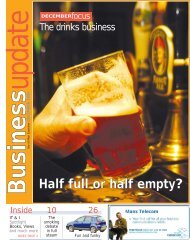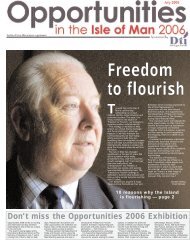Getting the balance right - Isle of Man Today
Getting the balance right - Isle of Man Today
Getting the balance right - Isle of Man Today
You also want an ePaper? Increase the reach of your titles
YUMPU automatically turns print PDFs into web optimized ePapers that Google loves.
18 Business update<strong>Isle</strong> <strong>of</strong> <strong>Man</strong> Examiner, May 2005ISSUEMAY focusWORK-LIFE BALANCEDon’t bury yourhead in <strong>the</strong>sandAlmost everyone gets stressed atsome stage during <strong>the</strong>ir workinglives but how widespread is <strong>the</strong>problem and how should it betackled? Penny Kay looks at howstress can be better managed.StressdiscriminationSickness absence due to stress iscosting UK business around £5billion a year, according to <strong>the</strong>Health and Safety Executive. And aroundhalf a million people in <strong>the</strong> UK experiencework-related stress at a level <strong>the</strong>y believe ismaking <strong>the</strong>m ill. There are no comparablestatistics available in <strong>the</strong> Island but it is agrowing area <strong>of</strong> concern for <strong>the</strong> Island’semployers, which urgently needs to beaddressed.Lee Harrison, managing director <strong>of</strong>consultancy People Dimensions, explains:‘The HSE has identified six key areas or“risk factors” that can be causes <strong>of</strong> workrelatedstress. Employer’s need to gain adetailed understanding <strong>of</strong> what <strong>the</strong>se riskfactors look like in <strong>the</strong>ir organisations,identify which areas may be presentingproblems and work with employees and<strong>the</strong>ir representatives to take action toreduce <strong>the</strong>se problems.’He adds: ‘It is important to have ways tomonitor and manage workload.Organisations need to recognise thatdifferent people are able to cope withdifferent levels <strong>of</strong> stress and <strong>the</strong>y must putprocedures in place to identify that.’It is a view shared by Anne Weadock,human resources manager at <strong>the</strong> HiltonHotel complex in Douglas. She says:‘Although it may not specifically be statedin legislation, we, as employers, owe ouremployees a duty <strong>of</strong> care. There is a duty <strong>of</strong>care to watch stress and <strong>the</strong> work-life<strong>balance</strong>.’‘It is not rocket science,’ adds DavidNixon, managing director <strong>of</strong> Merrill LynchInvestment <strong>Man</strong>agers. ‘You need to knowyour team and recognise that people aregoing to get stressed from time to time.’However, he believes that many people whosuffer from stress are in denial <strong>of</strong> <strong>the</strong> fact,which makes it more difficult to manage.‘There is a <strong>of</strong>ten a problemwith people admitting to <strong>the</strong>irown stress and it comes into abigger topic which is <strong>the</strong> stigmaattached to anything which isrelated to mental ill health,’ believesJan Bujko, training strategydevelopment <strong>of</strong>ficer at <strong>the</strong> DTI.‘There is such a stigma attached to itand so much discrimination andignorance that people <strong>the</strong>mselves, evenif <strong>the</strong>y may acknowledge <strong>the</strong>y are havingstress symptoms, are <strong>of</strong>tenreluctant to own up to itbecause <strong>the</strong>y may feelthat <strong>the</strong>y have failedor are inadequate.’The situation ismade worse because<strong>the</strong>re is a perception thatanyone can go to <strong>the</strong>ir GP and say <strong>the</strong>y arehaving a hard time at work and can getsigned <strong>of</strong>f for stress, according to ElaineHunter, human resources manager atshipping company, Dorchester Maritime. ‘Itcan be very hard for employers todetermine who is genuinely stressed orpeople who just want some time <strong>of</strong>f.’For those who are genuinely sufferingfrom stress, <strong>the</strong>re is plenty <strong>of</strong> help available.Stuart Garrett, human resources director atSteam Packet Company, explains that hisbusiness uses specialist occupationalmedical services, which are available in <strong>the</strong>Island and he also works in collaborationwith organisations such as <strong>the</strong> Drug AdviceService and Helpline (DASH), which <strong>of</strong>fersfree advice.The heavy drinking culture in <strong>the</strong> Island isone <strong>of</strong> <strong>the</strong> outcomes <strong>of</strong> a lack <strong>of</strong> work-life<strong>balance</strong> and stress, believes Ms Weadock.‘Stress can lead to alcoholism and drugtaking. It is a knock-on effect. Give people awork-life <strong>balance</strong> and <strong>the</strong>y might not go outand drink heavily on a Saturday and Sundaynight.’TAKE ACTION: Stress is a problem that cannot be ignoredLoss <strong>of</strong> productivityAbsenteeism from work can bedetrimental to both individuals andbusinesses. Dorchester Maritime’s MsHunter explains: ‘An employer needs toidentify those people who are perhapstrying too hard and are just going to stress<strong>the</strong>mselves out to <strong>the</strong> detriment <strong>of</strong> <strong>the</strong>business as well. If that person is at a seniorlevel and <strong>the</strong>y are <strong>of</strong>f work for six monthswith stress, that is going to have a bigimpact on <strong>the</strong> business.’Ms Weadock adds: ‘You can cost <strong>the</strong>impact to business on <strong>the</strong> productivity lostas opposed to <strong>the</strong> levels <strong>of</strong> absenteeismbecause people are not owning up to beingstressed. They are coming into work but<strong>the</strong>ir productivity is lower. The cost <strong>of</strong>accidents at work is around £5bn per yearin <strong>the</strong> UK because people are too tired andworking too many hours.’There is a perilous cultural change, whichis turning people into 24 hour, seven days aweek workers, believes Mr Nixon. ‘Peoplehave mobile phones and laptops andwhichever way you turn now you arecontactable. It is creating this downwardpressure on everyone and additional stress.Everyone thinks <strong>the</strong>y need to stay until10pm at night because that is what <strong>the</strong> bossdoes.‘The culture change has to come from <strong>the</strong>top to say enough is enough. We needquality work. There is a big difference instaying in <strong>the</strong> <strong>of</strong>fice for 70 hours a week andbeing effective. Sometimes you do need towork until 10pm, where necessary, but itshouldn’t be turned into <strong>the</strong> norm.’TURN TO PAGE 27
















